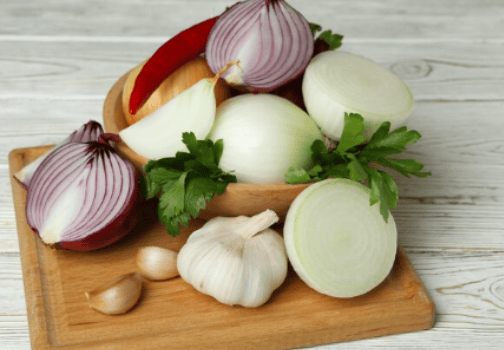Let’s be honest—brushing and flossing are essential, but they’re not the whole story when it comes to fresh breath. Ever notice how your breath still isn’t quite right, even after a good cleaning? That’s because what you eat can directly impact how your mouth smells—for better or worse.
Luckily, you don’t need fancy products or harsh chemicals to fix it. In fact, some of the best natural remedies for bad breath are already sitting in your kitchen. From crisp veggies to probiotic-rich snacks, certain everyday foods help neutralize odor-causing bacteria and promote a healthier mouth environment.
In this guide, we’ll explore simple, natural foods for fresh breath and how they work. Whether you’re battling occasional garlic breath or something more persistent, these solutions are backed by science—and easy to work into your daily routine. Let’s freshen things up naturally, one bite at a time.
Why Breath Smells Bad: The Root Causes
Bad breath, or halitosis, isn’t always a sign of poor hygiene—though that can be part of the picture. In many cases, the problem starts with a combination of natural processes inside your mouth and gut. Understanding the causes of bad breath can help you tackle it more effectively—and naturally.
The most common culprit? Bacteria buildup on your tongue and gums. These bacteria break down leftover food particles and release volatile sulfur compounds (VSCs)—those are the molecules responsible for the foul odor. If you skip flossing or don’t clean your tongue, this bacterial activity increases.
Another frequent cause is dry mouth (also known as xerostomia). Saliva helps rinse away debris and neutralize acids, so when your mouth is dry—due to dehydration, mouth breathing, or certain medications—odor-producing bacteria thrive.
Your diet also plays a role. Sugary foods feed harmful bacteria, while high-protein or low-carb diets (like keto) can trigger a chemical imbalance that worsens breath. And some foods—like garlic, onions, and spicy dishes—contain sulfur compounds that are absorbed into your bloodstream and released through your lungs.
In some cases, poor digestion or gut imbalance can contribute to odor that rises from within, especially if you suffer from acid reflux or bacterial overgrowth.
The good news? These are all manageable with a few mindful changes. Let’s look at how natural foods can help restore freshness from the inside out.
Top 10 Foods That Naturally Freshen Breath
Bad breath can be stubborn, especially when it lingers despite brushing and flossing. The good news? Some everyday foods can help fight odor naturally, thanks to their antibacterial, hydrating, or digestive-supporting properties. Let’s explore ten of the best foods that freshen breath naturally, along with the science behind why they work.
1. Parsley & Mint
These leafy green herbs are rich in chlorophyll, a natural deodorizer that helps neutralize sulfur compounds in the mouth. A 2014 study in International Journal of Food Sciences and Nutrition found that chlorophyll can help reduce oral malodor by suppressing volatile sulfur compounds (VSCs).
Plus, mint contains menthol, which not only freshens the breath but may also reduce bacteria levels temporarily.
2. Apples
Apples are nature’s toothbrush. Their crunchy texture and high water content help mechanically scrub the surface of the teeth and stimulate saliva production. According to research published in Journal of Breath Research (2016), raw apple consumption significantly reduces garlic breath due to its natural enzymes and polyphenols.
3. Yogurt
Probiotic-rich plain yogurt can help reduce levels of hydrogen sulfide and other odor-causing compounds in the mouth. A 2005 study in Journal of Applied Microbiology showed that daily yogurt consumption decreased bad breath by reducing bacteria such as Streptococcus mutans and Porphyromonas gingivalis.
Choose unsweetened varieties to avoid feeding odor-causing bacteria with added sugars.
4. Green Tea
Green tea contains polyphenols, particularly epigallocatechin gallate (EGCG), which has strong antioxidant and antimicrobial properties. A study published in Journal of Nutritional Science and Vitaminology found that green tea polyphenols can significantly reduce volatile sulfur compounds in saliva.
Sipping green tea after meals can help reduce bacteria and freshen breath naturally.
5. Cinnamon
Cinnamon contains cinnamic aldehyde, an essential oil that doesn’t just mask odor—it actually kills oral bacteria. A 2004 study in Journal of Clinical Dentistry found cinnamon-flavored chewing gum reduced bacteria responsible for halitosis more effectively than mint gum.
Add a cinnamon stick to tea or sprinkle ground cinnamon on yogurt or oatmeal.
6. Carrots & Celery
These fiber-rich vegetables boost saliva production and help remove plaque and food particles that can contribute to odor. Chewing them acts like a mild exfoliation for your teeth, stimulating gums and flushing bacteria from hard-to-reach areas.
They’re also packed with water, which helps prevent dry mouth—a major cause of halitosis.
7. Lemon Water
Drinking lemon water promotes hydration and introduces a burst of vitamin C, which creates a mildly acidic environment that discourages bacterial growth. According to a study in Oral Health & Preventive Dentistry (2015), increased salivary flow from acidic stimuli like lemon can reduce halitosis symptoms.
However, rinse your mouth with plain water afterward to avoid enamel erosion from acid.
8. Fennel Seeds
A traditional digestive and breath freshener, fennel seeds contain compounds like anethole and limonene with antimicrobial properties. Chewing fennel seeds has been shown to reduce odor-causing bacteria in the mouth while also soothing digestion—another common source of bad breath.
Research in Pharmaceutical Biology supports fennel’s antimicrobial effects against oral pathogens.
9. Ginger
Ginger not only adds zing to meals but also supports gut health and digestion. It contains a compound called gingerol, which stimulates an enzyme that helps break down sulfur compounds in the mouth. A study in Journal of Agricultural and Food Chemistry confirmed ginger’s ability to enhance enzyme activity related to breath freshness.
Try ginger tea or a small piece of raw ginger after meals.
10. Cheese
Cheese, especially aged varieties like cheddar, helps neutralize acidity in the mouth after eating. This discourages bacteria from producing odor. It’s also rich in calcium and phosphate, which help protect enamel and reduce bacterial buildup.
The American Academy of Pediatric Dentistry notes that cheese boosts saliva production, which naturally helps cleanse the mouth.
You don’t need to rely on artificial mints or gum to stay fresh. These natural foods that freshen breath can make a noticeable difference in your oral health and confidence. By incorporating more of them into your daily routine, you support a healthier mouth—without masking the problem.
Foods to Avoid That Worsen Breath

Even with perfect brushing, some foods can sabotage your breath. While many are tasty and common in everyday meals, they contain compounds or properties that encourage odor-causing bacteria. Being aware of these worst foods for breath can help you plan smarter meals and prevent embarrassing moments.
Garlic and Onions
These flavor-packed staples are well-known culprits. They’re rich in sulfur compounds like allicin, which can linger in your mouth—and even your bloodstream—long after eating. These compounds are released not just through breath, but also through your lungs and skin, making them especially hard to mask with brushing or mints.
Sugary Foods and Sweets
Sugar feeds the bacteria in your mouth, allowing them to multiply and produce volatile sulfur compounds. Candies, pastries, and soda create the perfect environment for plaque buildup and lingering odors.
Alcohol and Coffee
Both can dry out the mouth, reducing the saliva needed to wash away food particles and neutralize acids. Without adequate saliva, bacteria thrive—especially the types that cause bad breath. Coffee’s strong aroma can also mix with other mouth odors, making things worse.
Processed Meats
Cold cuts, sausages, and cured meats often contain preservatives and high protein levels. These break down into amino acids, which bacteria feed on—producing foul-smelling byproducts in the process.
You don’t have to cut these foods entirely, but moderation and timing (like avoiding them before social events) can make a big difference in your breath freshness.
Healthy Habits to Complement a Fresh-Breath Diet
Eating breath-freshening foods is a great start—but pairing them with smart daily habits is how you truly win the fight against bad breath. These simple, natural routines help keep your mouth clean, hydrated, and bacteria-free throughout the day.
Brush and Floss Regularly
Brushing twice a day removes plaque and leftover food particles that cause odor. Flossing is equally important—it cleans areas your toothbrush can’t reach, especially between teeth where bacteria love to hide.
Clean Your Tongue
A surprising amount of odor-causing bacteria live on your tongue. Using a tongue scraper or brushing your tongue daily can significantly reduce bad breath, especially in the back area where buildup often occurs.
Drink Plenty of Water
Water helps rinse away food particles and keeps your mouth moist. Dry mouth is a major trigger for bad breath, so staying hydrated throughout the day is essential—especially if you drink coffee or take medications that dry out your mouth.
Chew Sugar-Free Gum with Xylitol
Gum stimulates saliva production and helps clear debris. Xylitol, a natural sweetener, can even reduce harmful bacteria in the mouth over time.
Eat Small, Frequent Meals
Snacking on small, healthy items like apples, carrots, or nuts helps maintain saliva flow and keeps your breath fresh—especially if you go long hours between meals.
By combining these habits with a clean diet, you’ll support fresh breath all day, naturally and effectively.
FAQs: Natural Remedies and Foods for Bad Breath
Can food really help with bad breath?
Yes! Certain foods naturally fight odor-causing bacteria and help freshen breath. For example, apples and celery stimulate saliva, which helps rinse away debris, while herbs like parsley and mint contain chlorophyll that can neutralize odors. Yogurt with probiotics has even been shown to reduce levels of hydrogen sulfide in the mouth—a major culprit behind bad breath.
How quickly do breath-freshening foods work?
Some work almost instantly. Crunchy fruits and veggies can start scrubbing the mouth as soon as you eat them. Herbs like mint or fennel seeds can offer immediate freshness. However, long-term improvement happens when you make these foods a regular part of your diet, supporting both oral and digestive health.
Are there herbs that fix bad breath?
Absolutely. Parsley, mint, fennel, and cloves are classic natural breath fresheners. They contain compounds with antibacterial and deodorizing effects. For example, studies show that green tea (rich in catechins) and clove oil both reduce the presence of sulfur-producing bacteria in the mouth.
What’s better: gum or food for fresh breath?
Both can help, but real food often does more. Chewing sugar-free gum with xylitol boosts saliva and fights bacteria, but whole foods like apples, yogurt, and herbs provide nutrients, hydration, and fiber—all of which contribute to long-term freshness.
Conclusion
Fresh breath isn’t just about brushing and mouthwash—it starts with what’s on your plate. The right foods can naturally fight odor-causing bacteria, boost saliva flow, and even improve gut health, all of which play a role in how your breath smells. From crisp apples to probiotic-rich yogurt and herbs like mint and parsley, these everyday options are both delicious and effective.
By choosing foods that support oral health, you’re not only improving your breath—you’re investing in your overall well-being. Try incorporating a few of these natural breath-fresheners into your daily routine. With small, consistent changes, fresher breath can be a lasting (and tasty!) reality.
